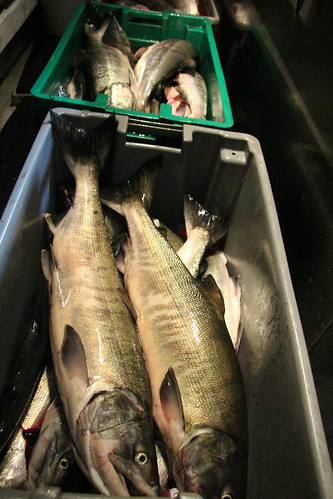Loki crew member processing fish on Njord, the second gillnetter vessel owned by Loki Fish Company. On top of a higher renewal fees for commercial fishing, fees for wholesaling, processing and marketing fish would increase.
The Ballard News-Tribune published a story earlier this month about the Washington Department of Fish and Wildlife proposing an initiative that would increase the commercial fishing license renewal fees for residents and lower the fees for non-residents.
The WDFW commission formulated the initiative as part of the 2016-19 state budget. The proposed fees would generate close to $4 million in revenue per year, with $700,000 of that coming from license fee changes.
In the report, the BNT interviewed Pete Knutson, a gillnetter and co-owner of Loki Fish Company. Knutson believes the new proposal taxes residential, small operation gillnetters disproportionally and favors large purse seiners and non-residential operations. For example, a Puget Sound Gillnetting Licenses for salmon currently costs $585 for residential commercial fishers and $890 for non-residents. The proposed change would make the fee $750 for residents and non-residents alike. Moreover, a purse seine license renal fee for residents is currently $735, non-residents $1190. The fee would be “equalized” at $750 for all parties. Other fees are going up for handers, processors and wholesalers.
Knutson believes that the policy favors big business and out-of-state interests.
“WDFW permit renewal fees do not recognize proportionality. For example, a resident gillnet permit renewal is $585 whereas a resident purse seine renewal fee is $735. This is grossly disproportionate to the harvest of the two fisheries, since the average purse permit harvests a public resource value five times greater than that of the comparable Puget Sound gillnet permit holder,” said Knutson.
“So the department would charge a billion dollar corporation the same permit renewal fee as a small boat fisherman. … Outrageous.”
He points to a lack of commercial fishing representation in the nine-member, governor appointed commission. Robert “Bob” Kehoe is a member of the commission representing King County. Kehoe is the Executive Director of the Purse Seine Vessel Owners’ Association. The PSVOA represents vessel owners from up and down the west coast. One of the members is Trident Seafood, which holds at least seven of the 80 Washington State permits, which are valued at $200,000 each. Gillnetter permits are valued at $25,000.
In light of the initiative policies, which would open the door even wider for non-resident fishers, Knutson believes Kehoe has a conflict of interest and that the initiative obviously favors purse seiners.
However, officials say that the initiative has more to do with protecting the State from lawsuits, rather than fishing itself.
“We decided to propose aligning resident and non-resident fees after recent court decisions – such as a ruling last year in California – found it discriminatory to charge non-resident and resident commercial fishers different license fees. … With this legal precedent in mind, we proposed aligning the fees for most of our commercial licenses to avoid costly litigation, which, in turn, could greatly disrupt some of the services the department provides to all license holders in the state,” Darren Friedel of the WDFW.
Others still say the new policies seem “fishy.” Bryan Monsaas was a purse seiner for 15 years in the late 1980s and 90s. He’s 48 and lives in Everett.

Chum salmon fresh out of Puget Sound. Washington residents could be paying the same amount as non-residents for permit renewals should the WDFW initiative be adapted by Governor Inslee in the State budjet.
“Kehoe specifically represents purse seiners and not all of them are Washington State residents…so he has a conflict of interest being on the commission that oversees conservation efforts. I think the commission should be made up of more citizens at large or at least knowledgeable people that aren’t necessarily stakeholders,” said Monsaas.
About the fees, Monsaas said they seem unfair.
“I don't’ honestly think it’s fair. I do think it should be based more on a percentage of resources taken as I believe in Alaska – larger operations pay a larger fees. … As an ex-purse seiner, sure I wouldn't mind paying less for a license renewal, but I don’t think it’s right.”
As for more non-residents fishers paying the same as residents, Monsaas said it doesn't make sense.
“They’re not going to be putting money into our state coffers unless we charge them.”
Knutson was left asking a question:
“Why should a non-resident, who doesn’t pay in to the state’s general fund as do residents, not be charged extra so they’re not riding on the backs of residents?”